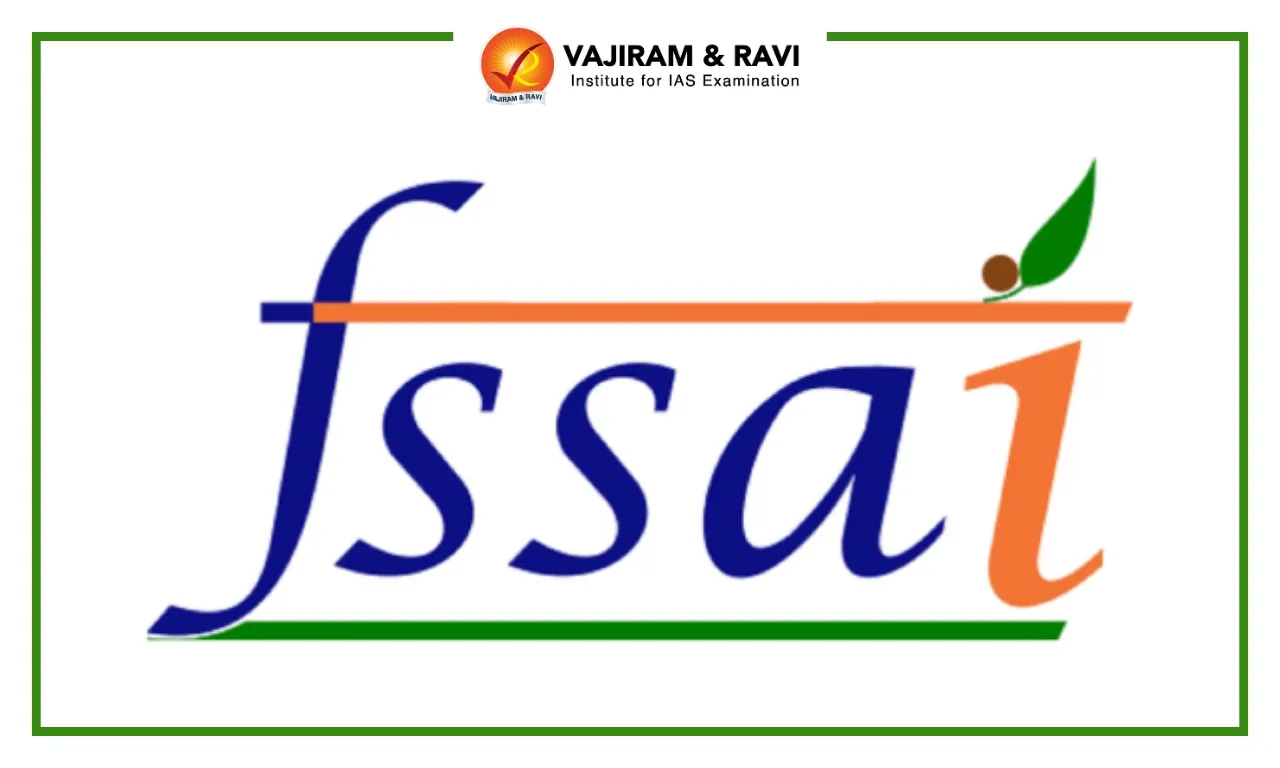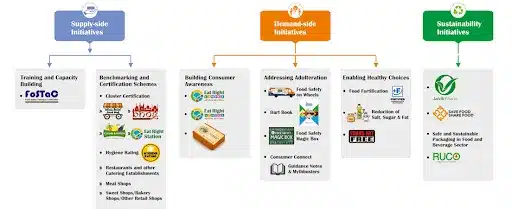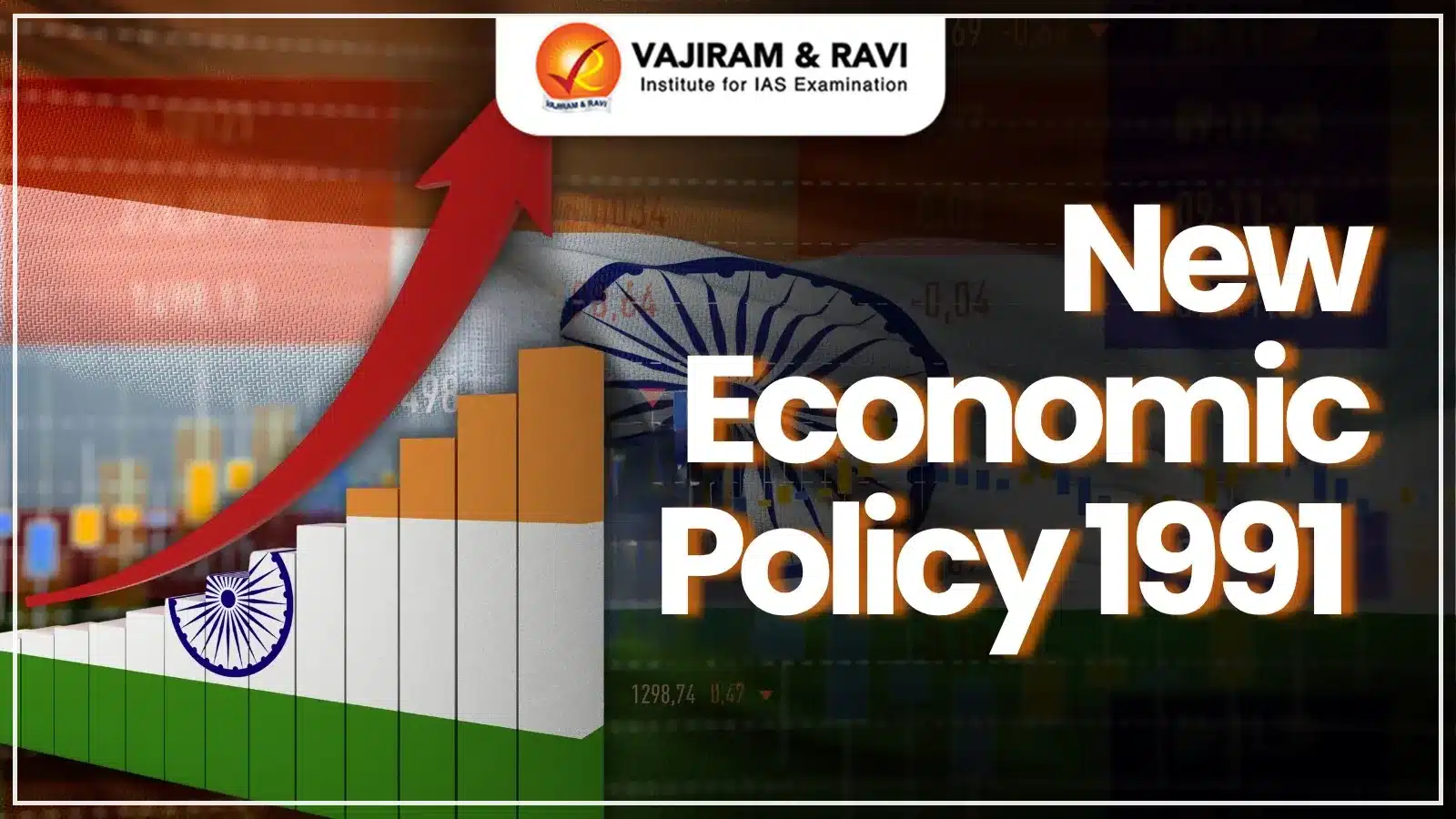FSSAI or Food Safety and Standards Authority of India, established in 2008, regulates food safety and quality in India. It consolidates various food laws and sets standards for food products, including additives, contaminants, and nutrition. FSSAI issues licenses to food businesses, monitors quality, and provides scientific advice for policy-making. It promotes consumer awareness through initiatives like "Eat Right India" and "Save Food, Share Food."
Despite challenges such as regulatory gaps, infrastructure limitations, and consumer awareness, FSSAI aims to improve food safety by enhancing its regulatory framework, infrastructure, and consumer education efforts.
FSSAI About
FSSAI (Food Safety and Standards Authority of India) is an autonomous body established under the Ministry of Health and Family Welfare, Government of India. It is responsible for regulating and ensuring the safety of food products in India.
FSSAI Full Form
FSSAI Full Form is the Food Safety and Standards Authority of India. Earlier, food safety and standards in India were regulated by multiple acts and orders under various ministries and departments, such as the Prevention of Food Adulteration Act, of 1954, the Fruit Products Order of 1955, the Meat Food Products Order of 1973, and several others.
- However, to streamline and consolidate these regulations, the Food Safety and Standards Act, of 2006 was enacted, leading to the establishment of the FSSAI (September 5, 2008) as a single, independent statutory body under the Ministry of Health and Family Welfare.
FSSAI Functions
FSSAI functions include setting standards, granting licenses, managing risks, accrediting labs, and promoting consumer awareness. As outlined in Section 16 of the FSS Act 2006, it regulates and monitors the manufacture, processing, sale, and import of food to ensure safety and quality.
- Regulation and Licensing: FSSAI formulates rules and regulations for food safety, sets standards for food articles, and establishes limits for additives, contaminants, pesticide residues, and antibiotics.
- FSSAI issues a 14-digit license number to compliant Food Business Operators (FBOs), ensuring quality assurance for consumers.
- Quality Control and Risk Management: To maintain food quality, FSSAI monitors contaminants, prevents adulteration, and identifies emerging risks in the food market. It employs surveys and risk analysis to proactively address safety concerns and crises.
- Scientific Advice and Policy Support: FSSAI provides scientific and technical advice to governments for policy-making and food safety crisis management. It also ensures consistency between domestic and international food safety standards.
- Lab Accreditation and Oversight: The authority accredits laboratories and certification bodies, establishes procedures for sampling and analysis, and ensures compliance for domestic and imported food products.
- Consumer Awareness and Labelling: FSSAI promotes consumer awareness of food safety and hygiene while setting standards for food labeling, including nutrition and health claims, to empower informed decision-making.
- Training, Education, and Public Engagement: FSSAI conducts training programs for food businesses and stakeholders, enhances compliance with food safety norms, and engages with consumers and local bodies through awareness campaigns.
- Audits and Emergency Management: Regular audits are carried out to ensure adherence to food safety guidelines. Additionally, FSSAI develops crisis management plans to address emergencies related to food safety.
FSSAI Structure
Food Safety and Standards Authority of India (FSSAI) operates under the Ministry of Health and Family Welfare, with a comprehensive governance and operational framework aimed at ensuring food safety across India. The Composition of the Food Authority (as per Section 5 of the FSS Act) comprises a Chairperson and 22 members, with one-third being women. These include:
- Ex-Officio Members: Seven Joint Secretaries from key ministries (Agriculture, Commerce, Consumer Affairs, Food Processing, Health, Legislative Affairs, Small Scale Industries).
- Industry Representatives: Two from the food industry, and one from small-scale industries.
- Consumer Organizations: Two representatives.
- Eminent Experts: Three food technologists/scientists.
- State/UT Representatives: Five members, rotated every three years.
- Farmers' Organizations: Two representatives.
- Retailers' Organizations: One representative.
FSSAI Legislative Framework
FSSAI legislative framework was established by the Food Safety and Standards Act, 2006. The Food Safety and Standards Rules, 2011 and Regulations, 2011 further define procedures, qualifications, and responsibilities for stakeholders in the food industry.
- Food Safety and Standards Act, 2006: It consolidates various food safety laws into a unified framework, establishing the FSSAI to regulate food safety and standards. It aims to ensure safe and wholesome food for consumers by overseeing the manufacture, storage, distribution, sale, and import of food. Its key features include:
- Unified Regulatory Framework: Replaces older laws like the Prevention of Food Adulteration Act, Fruit Products Order and others with a comprehensive structure.
- FSSAI's Role: Sets science-based standards for food products and enforces regulations across the food supply chain.
- Licensing & Registration: Mandates a uniform system for food businesses to maintain consistent standards.
- Safety Measures: Prohibits unauthorized additives and sets limits on contaminants and toxins.
- Consumer Protection: Includes provisions for food recalls, surveillance, and penalties for non-compliance.
- Food Safety and Standards Rules, 2011: Under Section 91 of the Food Safety and Standards Act, 2006, the Central Government is authorized to make rules for the Act’s implementation. The Food Safety and Standards Rules, 2011 were notified to regulate various aspects, including:
- Chairperson and Members: Defines the salary, terms, and oath-taking procedure for the Chairperson and Members of the Food Authority.
- Food Safety Officers and Analysts: Specifies qualifications and procedures for Food Safety Officers and Analysts, including document seizure and sample analysis.
- Court and Tribunal Procedures: Outlines referral to courts, adjudication procedures, and the qualifications and powers of Tribunal officers, including appeal processes and fees.
- Financial Management: Covers the preparation of the budget, accounts, and the annual report by the Food Authority.
- The Food Safety and Standards Regulations, 2011: Under Section 92 of the Food Safety and Standards Act, 2006, the Food Authority, with the approval of the Central Government, can make regulations to implement the Act and its rules. These regulations cover various aspects like:
- Food safety standards for human consumption (Section 16)
- Food recall procedures (Section 28)
- Food analysis procedures (Section 40)
- Registration and licensing of food businesses (Section 31)
- Packaging, labeling, and additives (Sections 20, 21, and 23)
- In addition, the FSSAI has notified several important regulations over time.
FSSAI Significance
The significance of FSSAI lies in its role as a regulatory authority, setting food safety standards, ensuring quality control, and protecting public health. It also promotes consumer awareness, supports scientific research, and addresses emerging challenges to ensure safe food practices across the industry.
- Regulatory Authority: FSSAI sets comprehensive food safety standards and mandates licenses for food businesses, ensuring consistent quality.
- Public Health Protection: FSSAI monitors food manufacturing, particularly high-risk products like packaged drinking water, to safeguard consumer health.
- Setting Standards: It establishes nutrition, food fortification, and labelling standards, e.g., rice fortification with iron and folic acid.
- Consumer Awareness: FSSAI educates the public through campaigns like "Eat Right India," reaching millions to promote healthy eating practices.
- Scientific Research: Collaborates with global organizations and compiles food safety data for risk management.
- Capacity Building: FSSAI supports industry growth by accrediting over 250 food testing labs and providing training programs.
- Addressing Emerging Challenges: Tackles issues like e-commerce regulations and contamination controls, ensuring safe food distribution.
- Public Engagement: Ensures transparency through grievance redressal mechanisms and continuous updates to reflect new food safety trends.
FSSAI Initiatives
FSSAI's initiatives aim to promote healthier, safer, and more sustainable food practices across India. From the "Eat Right India" movement the the initiatives are divided into supply-side initiatives, demand-side initiatives, and sustainable initiatives as follows:
- Eat Right India Movement (2018): This initiative promotes safe, healthy, and sustainable food practices through consumer awareness campaigns, workshops, and public participation. It emphasises balanced diets and responsible food choices, impacting millions nationwide.
- Save Food, Share Food, Share Joy: Focused on reducing food wastage and addressing hunger, this initiative organizes food donation drives, collaborates with NGOs, and educates the public, aiming to curb the 40% food wastage in India.
- Clean Street Food Hub (2019): Aimed at improving hygiene standards for street food vendors, FSSAI conducts training and certification programs, resulting in safer street food through enhanced vendor compliance.
- Diet4Life: This program combats metabolic disorders like obesity and diabetes by promoting dietary interventions and collaborations with healthcare professionals for tailored nutrition plans.
- RUCO (Repurpose Used Cooking Oil): This sustainable initiative collects used cooking oil for conversion into biodiesel, addressing environmental concerns and repurposing over 7 lakh tons of annual waste.
- FoSTaC (Food Safety Training and Certification): Focusing on food business operators, this program trains food safety supervisors through structured modules, improving compliance with safety standards across the industry.
- ‘Aaj Se Thoda Kam’ Campaign (2020): This campaign promotes reduced consumption of salt, sugar, and fat through workshops and media outreach, advocating healthier cooking and eating habits.
- Jaivik Bharat: Encouraging organic farming and consumption, it introduces certifications and a green logo for organic products, aligning with the growing demand for health-conscious choices.
- Food Fortification Initiatives: This addresses micronutrient deficiencies by fortifying staples like rice and salt with essential vitamins and minerals, preventing millions of anemia cases annually.
- Eat Right Campus and School Programs: Targeting educational institutions, this initiative instills healthy eating habits through nutrition workshops and healthier school menus.
- DART (Do it Yourself Adulteration Testing): A consumer empowerment tool that enables simple, home-based adulteration tests using an accessible and practical guidebook.
FSSAI Challenges
FSSAI faces challenges such as regulatory gaps, limited infrastructure, and a shortage of qualified personnel. Additionally, complex regulations, low consumer awareness, and emerging issues like e-commerce and chemical contaminants hinder effective food safety enforcement.
- Regulatory Gaps: A significant portion of the food supply, especially from small vendors and street hawkers, remains unregulated, increasing food safety risks. Furthermore, FSSAI only covers around 377 products, which is limited compared to international standards.
- Infrastructure Deficiencies: The shortage of accredited labs and public testing facilities hampers timely inspections and monitoring. The rising volume of imports exacerbates this issue, creating pressure on existing facilities.
- Human Resource Constraints: The lack of qualified personnel, particularly in state laboratories and enforcement agencies, limits inspection capacity and regulatory oversight.
- Financial Constraints: FSSAI faces underfunding, which impacts its capacity to monitor compliance, build infrastructure, and enhance its regulatory efforts.
- Complex Regulations: Overlapping standards and unclear compliance requirements create confusion for Food Business Operators (FBOs). This complexity hinders uniform regulatory adherence and makes enforcement inconsistent across sectors.
- Consumer Awareness: Public knowledge about food safety regulations is limited, leaving consumers vulnerable to unsafe practices.
- Emerging Issues: The rise of e-commerce and online food delivery services presents regulatory challenges, as ensuring food safety on these platforms requires adapting existing standards.
- Additionally, the presence of chemical contaminants remains a growing concern, with FSSAI working on implementing Maximum Residue Levels (MRLs).
FSSAI Way Forward
The way forward for FSSAI involves expanding its regulatory framework, enhancing infrastructure, increasing consumer awareness, and leveraging technology to improve food safety and compliance across India.
- Strengthening Regulatory Framework: FSSAI should expand its regulatory coverage to include more food products, addressing emerging safety issues and adapting to consumer trends.
- Simplifying the licensing process for food businesses, particularly small vendors and startups, will enhance compliance and operational efficiency.
- Enhancing Infrastructure: To strengthen food safety, FSSAI needs to increase the number of NABL-accredited food testing labs, as the current number of 87 is insufficient.
- Capacity Building and Training: FSSAI must focus on hiring more Food Safety Officers (FSOs) and qualified personnel to ensure effective enforcement of food safety standards.
- Consumer Awareness Initiatives: FSSAI should intensify its efforts in educating the public about food safety through campaigns like "Eat Right India."
- Leveraging Technology: The development of digital platforms for food businesses to track compliance and submit applications will improve transparency and streamline regulatory processes.
FSSAI UPSC PYQs
Question 1: Elaborate the policy taken by the Government of India to meet the challenges of the food processing sector. (UPSC Mains 2021)
Question 2: Consider the following statements: (UPSC Prelims 2018)
- The Food Safety and Standards Act, 2006 replaced the Prevention of Food Adulteration Act, 1954.
- The Food Safety and Standards Authority of India (FSSAI) is under the charge of Director General of Health Services in the Union Ministry of Health and Family Welfare.
Which of the statements given above is/are correct?
(a) 1 only
(b) 2 only
(c) Both 1 and 2
(d) Neither 1 nor 2
Answer: (a)
Last updated on March, 2026
→ UPSC Notification 2026 is now out on the official website at upsconline.nic.in.
→ UPSC IFoS Notification 2026 is now out on the official website at upsconline.nic.in.
→ UPSC Calendar 2026 has been released.
→ UPSC Final Result 2025 is expected to be released soon.
→ Check out the latest UPSC Syllabus 2026 here.
→ Join Vajiram & Ravi’s Interview Guidance Programme for expert help to crack your final UPSC stage.
→ UPSC Mains Result 2025 is now out.
→ UPSC Prelims 2026 will be conducted on 24th May, 2026 & UPSC Mains 2026 will be conducted on 21st August 2026.
→ The UPSC Selection Process is of 3 stages-Prelims, Mains and Interview.
→ Prepare effectively with Vajiram & Ravi’s UPSC Prelims Test Series 2026 featuring full-length mock tests, detailed solutions, and performance analysis.
→ Enroll in Vajiram & Ravi’s UPSC Mains Test Series 2026 for structured answer writing practice, expert evaluation, and exam-oriented feedback.
→ Join Vajiram & Ravi’s Best UPSC Mentorship Program for personalized guidance, strategy planning, and one-to-one support from experienced mentors.
→ Check UPSC Marksheet 2024 Here.
→ UPSC Toppers List 2024 is released now. Shakti Dubey is UPSC AIR 1 2024 Topper.
→ Also check Best UPSC Coaching in India
FSSAI FAQs
Q1. What is FSSAI and its role?+
Q2. Who regulates the FSSAI?+
Q3. Which are the three types of FSSAI license?+
Q4. What is the difference between FCI and FSSAI?+
Q5. What is the colour code for FSSAI?+
Tags: fssai quest UPSC Polity Notes















